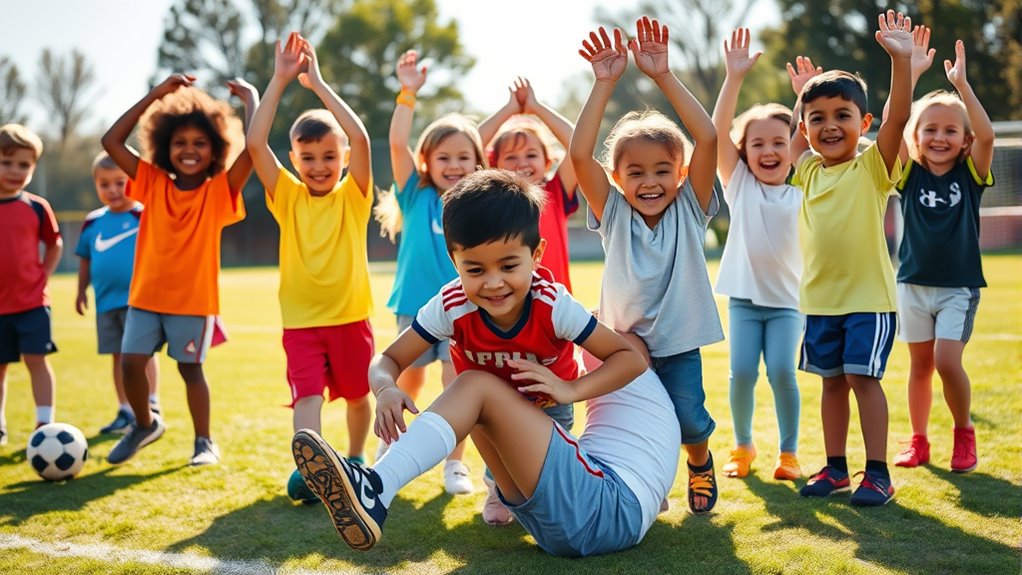To encourage kindness on team sports days, set clear positive expectations for respectful communication and sportsmanship. Model good behavior yourself and recognize acts of kindness like cheering teammates or sharing water. Create an inclusive environment where everyone feels valued and support each other. Address unkind acts immediately to maintain a respectful atmosphere. By fostering trust, teamwork, and positive reinforcement, you help build a caring, supportive community — discover more ways to promote kindness in these events.
Key Takeaways
- Establish clear expectations emphasizing sportsmanship, respect, and kindness before activities begin.
- Model respectful behavior and recognize acts of kindness during sports events to encourage positive interactions.
- Incorporate inclusive activities that promote teamwork, collaboration, and mutual support among all participants.
- Address unkind behavior immediately with calm discussions and reinforce the importance of respectful communication.
- Use outdoor team-building games to foster camaraderie, trust, and a supportive environment for everyone.
Setting the Tone With Positive Expectations
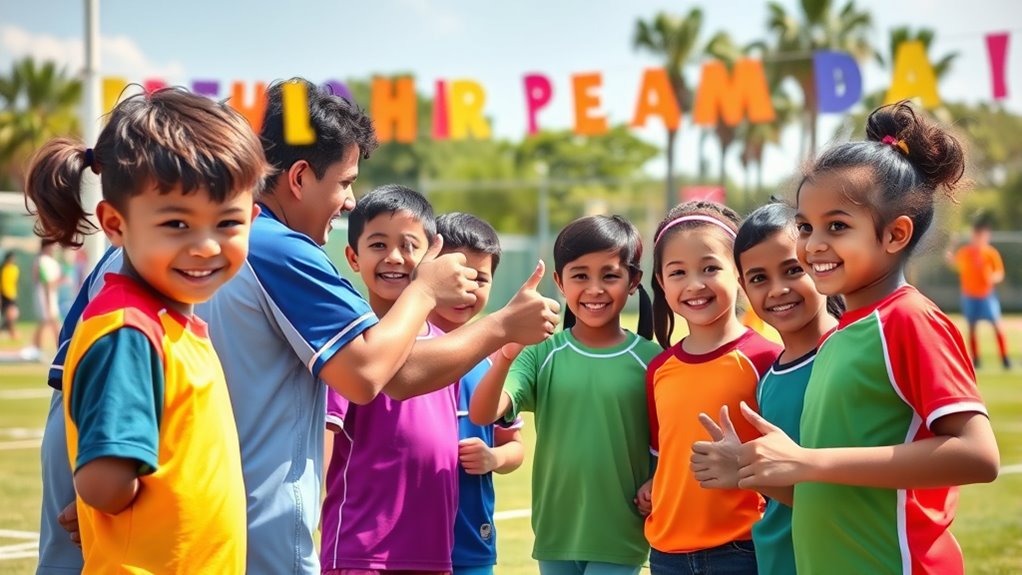
To foster a culture of kindness on team sports days, it’s essential to start by setting clear, positive expectations. When you establish a foundation of respectful communication, you encourage players to support one another and build strong team spirit. Make it known that sportsmanship matters more than winning, and emphasize the importance of kindness both on and off the field. Use encouraging language and highlight the value of working together, regardless of the game’s outcome. By clearly outlining your expectations early, you create an environment where everyone feels safe and motivated to contribute positively. This approach helps players understand that respect and collaboration are key to a successful and enjoyable team experience. Incorporating attention to detail in observing players’ interactions can further promote a respectful atmosphere.
Teaching the Value of Good Sportsmanship

Teaching the value of good sportsmanship is essential for creating a positive and respectful sports environment. When you emphasize sportsmanship etiquette and fair play principles, you help children learn respect, humility, and teamwork. To foster this, consider these steps:
Teaching good sportsmanship fosters respect, humility, and teamwork in a positive sports environment.
- Demonstrate sportsmanship etiquette by applauding good plays and avoiding negative comments.
- Reinforce fair play principles by encouraging honest effort and respecting referees’ decisions.
- Address unsportsmanlike behavior immediately, explaining why respect matters on and off the field.
- Highlight the importance of sportsmanship etiquette in building character and lifelong values.
Modeling Respectful Behavior as a Leader
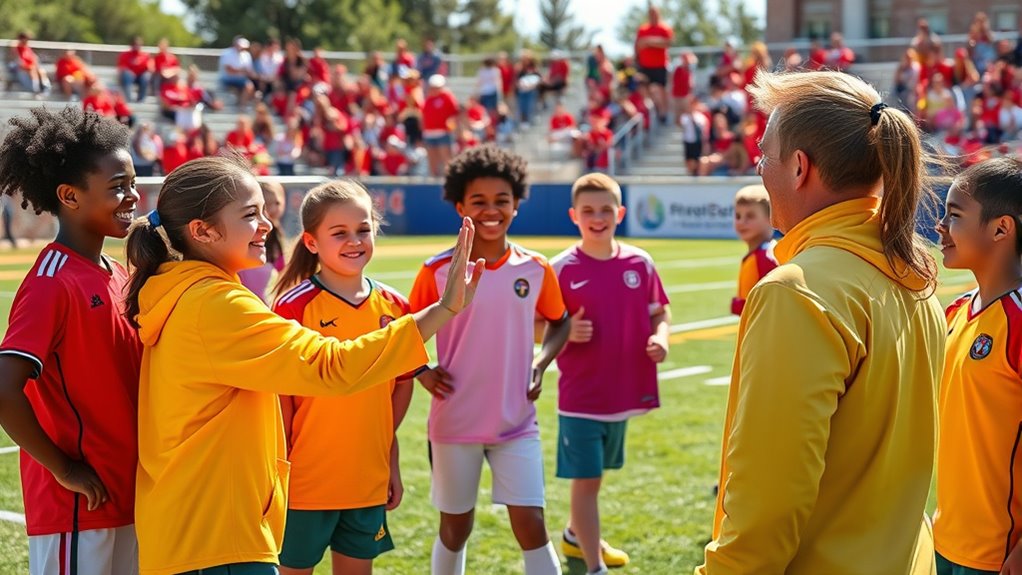
Have you ever noticed how players often follow the example set by their coaches and leaders? When you model respectful behavior, you directly influence the team’s atmosphere and reinforce positive values. Demonstrate good sportsmanship, listen actively, and treat everyone with kindness, even during intense moments. Your leadership qualities shine when you show respect for officials, opponents, and teammates alike. This sets a standard that encourages others to act similarly, strengthening team spirit. By consistently exhibiting respectful behavior, you create a safe environment where kindness and fairness thrive. Your actions speak louder than words, inspiring players to mirror your attitude. Ultimately, your leadership helps build a cohesive, supportive team culture, making sports days memorable for all involved while fostering respect and camaraderie. Practicing respectful behavior regularly can also positively influence the overall team dynamics and performance.
Recognizing and Celebrating Acts of Kindness
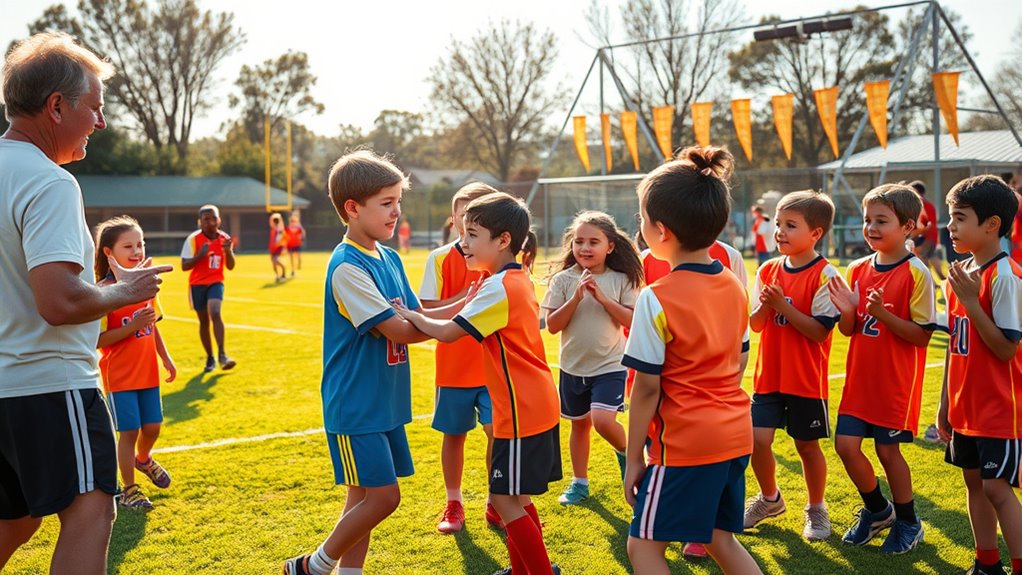
You can make kindness stand out by spotlighting small gestures that often go unnoticed. Sharing positive stories encourages others to follow suit and creates a supportive environment. Recognizing and rewarding acts of compassion helps reinforce the importance of kindness on sports days. Incorporating costumes and accessories into celebrations can also add an element of fun and camaraderie, further promoting a positive atmosphere.
Spotlight Small Gestures
Small acts of kindness often go unnoticed, but they can have a powerful impact on team spirit during sports days. Recognizing and celebrating these small gestures boosts morale and encourages positive team interactions. To highlight these moments, try:
- Acknowledging a teammate’s effort with a simple “great job”
- Passing a water bottle to someone in need
- Complimenting someone’s sportsmanship or teamwork
- Creating a fun and engaging environment that celebrates good sportsmanship and kindness.
These actions serve as encouragement techniques, fostering a supportive environment. When you spotlight small gestures, you remind everyone that kindness matters just as much as winning. Such recognition reinforces positive behaviors and cultivates a sense of unity. By focusing on these little acts, you help build a team where encouragement and respect flourish naturally. Small gestures truly make a big difference.
Share Positive Stories
Highlighting positive stories of kindness during team sports days can inspire others to follow suit. When you share acts of sportsmanship and teamwork, you reinforce the importance of team spirit and encourage a supportive environment. Celebrating these moments shows that kindness doesn’t diminish competitiveness; instead, it enhances the overall experience. Recognizing acts like helping a teammate up or cheering for others promotes a balanced, inclusive atmosphere where everyone feels valued. By sharing these stories, you set a powerful example and motivate others to act kindly. This not only boosts morale but also fosters a culture where competitive balance and compassion go hand in hand, making sports days more enjoyable and meaningful for all participants. Utilizing community support features can further amplify these positive stories and sustain a motivating environment.
Reward Compassion Efforts
Recognizing and celebrating acts of kindness during team sports days can substantially reinforce positive behavior and foster a supportive environment. To truly reward compassion efforts, consider implementing simple methods like:
- Highlighting acts of kindness during announcements or team meetings, encouraging players to share their gratitude journaling experiences.
- Organizing kindness challenges that motivate players to perform friendly gestures, with rewards for consistent effort.
- Giving small tokens or praise to players who demonstrate compassion, inspiring others to follow suit.
- Reinforcing the importance of digital literacy by discussing respectful online interactions that mirror kindness on the field.
Creating Inclusive and Supportive Team Environments
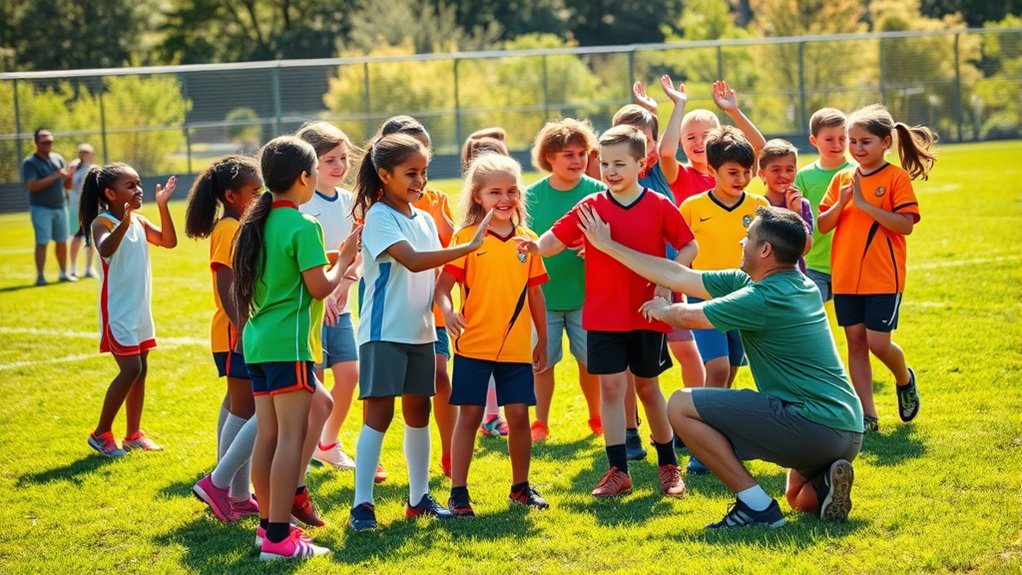
Creating an inclusive and supportive team environment is essential for fostering kindness and cooperation during sports days. When you focus on team bonding, you help everyone feel connected and valued. Incorporate inclusive activities that allow all participants to join in, regardless of skill level or background. Encourage teammates to cheer each other on and celebrate successes together. By promoting open communication and mutual respect, you create a space where kindness thrives. Make sure activities are designed to include everyone, which boosts confidence and reduces exclusion. When team members feel supported and accepted, they’re more likely to display kindness and work collaboratively. Incorporating elements of modern farmhouse decor, such as warm textiles and natural materials, can also contribute to creating a welcoming atmosphere that supports inclusivity. This atmosphere not only enhances the experience but also strengthens relationships that carry over beyond the sports day.
Encouraging Peer Support and Collaboration

Encouraging peer support and collaboration is essential for building a positive and energetic atmosphere during sports days. You can foster teamwork by organizing activities that promote team building, where students learn to trust and rely on each other. Consider these strategies:
- Implement team building activities that require cooperation and communication.
- Promote peer mentorship, pairing experienced students with newcomers to boost confidence.
- Encourage teammates to cheer each other on, emphasizing collective success over individual achievement.
- Incorporate diverse designs in team-related equipment or decorations to enhance engagement and inclusivity.
Addressing Unkind Behavior Effectively

When unkind behavior occurs during sports days, addressing it promptly and effectively is essential for maintaining a positive environment. You should focus on conflict resolution techniques that help both parties feel heard and understood. Encourage calm discussions, allowing students to express their feelings without anger or blame. It’s also important to teach conflict avoidance strategies, so students learn to recognize early signs of tension and step back before issues escalate. When you intervene quickly, you set a clear expectation that unkindness isn’t tolerated. Reinforce respectful behavior and remind students of the importance of kindness and teamwork. By handling unkind acts with consistency and fairness, you help create a supportive atmosphere where everyone feels safe and valued. Incorporating suitable outdoor activities can also promote teamwork and positive interactions among students.
Frequently Asked Questions
How Can Parents Reinforce Kindness Outside of Sports Events?
You can reinforce kindness outside of sports events by maintaining open parent-child communication, encouraging your child to express their feelings and listen empathetically. Use positive reinforcement strategies like praising acts of kindness and modeling respectful behavior yourself. When you notice your child showing kindness, acknowledge it sincerely. This consistent approach helps your child understand the importance of kindness, fostering a caring attitude that extends beyond team sports days into everyday life.
What Are Creative Ways to Teach Empathy During Team Activities?
To teach empathy during team activities, you can introduce role-playing scenarios where you ask participants to see things from others’ perspectives. Incorporate empathy-building exercises like sharing stories or practicing active listening. These activities help you understand teammates’ feelings and foster compassion. By making these activities fun and engaging, you encourage everyone to develop empathy naturally, strengthening team bonds and creating a supportive environment.
How Do Coaches Handle Persistent Unkind Behavior?
Imagine coaching in a world where behavior management is vital. When you face persistent unkind behavior, you step in with calm authority, addressing issues early. Use conflict resolution strategies to understand why players act out, and set clear expectations for respectful conduct. Consistency is essential—reinforce positive actions and follow through on consequences. By maintaining a firm yet empathetic approach, you foster a team environment rooted in respect and sportsmanship.
What Role Do Team Captains Play in Fostering Kindness?
As a team captain, your leadership influence is essential in fostering kindness. You set the tone by demonstrating respect and sportsmanship, inspiring others to follow your example. Use positive reinforcement to acknowledge acts of kindness and teamwork, encouraging your teammates to do the same. Your proactive approach helps create a supportive environment where everyone feels valued, making the team stronger and more united on and off the field.
How Can Schools Involve the Community in Promoting Sportsmanship?
Imagine banners fluttering at a school event, symbolizing community support. You can involve the community by forming partnerships with local organizations and encouraging student-led initiatives that promote sportsmanship. When parents, local businesses, and community leaders participate, it creates a united atmosphere that fosters respect and kindness. These collaborations inspire students to embody sportsmanship values, making the event inclusive and memorable for everyone involved.
Conclusion
By fostering kindness on team sports days, you create an environment where everyone feels valued and motivated to succeed. Your positive influence can transform a simple game into a lifelong lesson of respect and teamwork. Remember, your actions have the power to inspire kindness that spreads faster than wildfire, igniting a community built on empathy and support. Keep leading with heart, and watch your team flourish into a truly extraordinary team—one that stands out as a shining beacon of sportsmanship.
